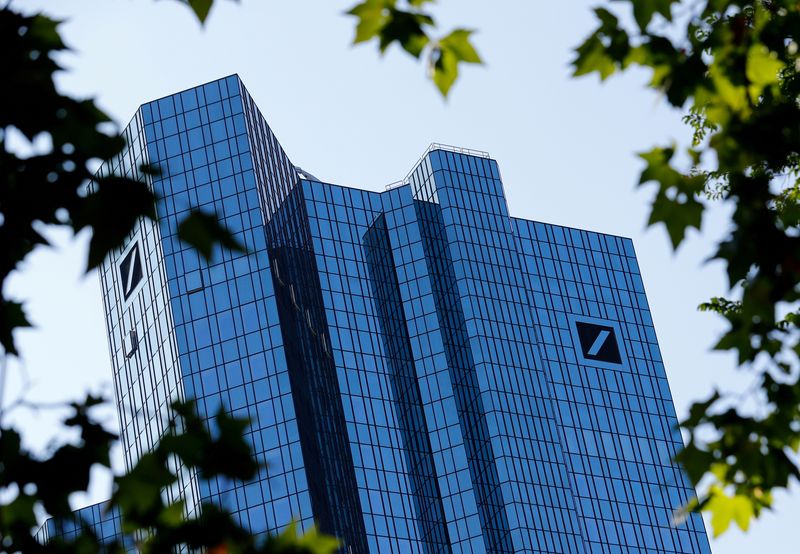By Tom Sims and Marta Orosz
FRANKFURT (Reuters) -Deutsche Bank posted a better-than-expected 51% rise in second-quarter profit on Wednesday as investment banking revenues rose, though the lender was less optimistic about the division's prospects for the full year and warned about the economic outlook.
Germany's largest lender also dropped its cost target for the full year and was more cautious about chances of achieving a key profit target due to inflation and a looming energy crisis.
The results come amid a week of earnings reports by major lenders across Europe, where investors are watching for signs that a weaker economy, higher interest rates and the war in Ukraine are weighing on their operations and outlooks.
Germany's banks are at the centre of a geopolitical storm because the country is particularly dependent on Russian energy and its economy will be hit hard by any supply shortages.
Net profit attributable to shareholders was 1.046 billion euros ($1.06 billion) in the quarter. That compares with profit of 692 million euros a year earlier, and it is better than analyst expectations for profit of around 788 million euros.
It was the eighth consecutive quarter of profit, a notable streak after years of losses.
This year is crucial for Germany's largest lender and Chief Executive Christian Sewing as he tries to deliver on targets he set out in a costly overhaul of the bank embarked upon in 2019.
Sewing wrote to staff that they should be proud of the results but in the memo sounded bleak about the near-term economic outlook.
"The months ahead will continue to be challenging. There is reason to believe that things will become even more difficult economically," he wrote.
The bank scaled back its cost target, no longer aiming for a cost-to-income ratio of 70% for this year due to inflation, bank levies and other costs related to the war in Ukraine. It now expects the ratio to be as high as the mid 70s.
Investors have long questioned whether the bank will hit its most important target - a return on tangible equity of 8% - this year, and Chief Financial Officer James von Moltke said the bank had "introduced a note of caution" on meeting it because of the risk Germany faces from getting cut off from Russian gas.
The bank stuck to its overall revenue guidance but was less optimistic and revised down its outlook for the investment bank, now expecting revenues to be "essentially flat" this year, compared with previous expectations for "slightly higher".
Deutsche - like its U.S. competitors - was hurt by declines in dealmaking amid the uncertainty created by the war, although trading held up because of volatile markets.
Overall investment banking revenues were up 11% in the quarter, but revenue from the investment bank's origination and advisory business declined 63% in the quarter.
Revenue for fixed-income and currency trading, one of the bank's largest divisions, rose 32%.
Deutsche, also like some of its U.S. competitors, took a hit on its leveraged loans books as the outlook for dealmaking turns sour amid rising interest rates and extreme market volatility caused by the Russian invasion of Ukraine.
Deutsche took a writedown of 150 million euros in the quarter.
Leveraged loans are usually taken out by companies that have high levels of debt, and a widening of the credit spread means mark-to-market losses for banks.

In a bright spot, revenue at the corporate bank rose 26%, helped by rising interest rates.
($1 = 0.9854 euros)